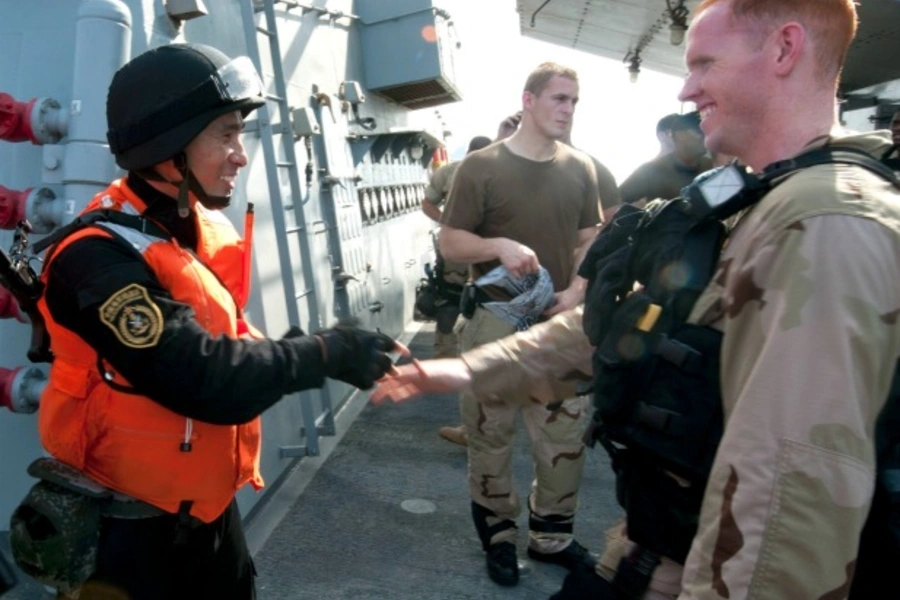Erickson and Strange: No Substitute for Experience

More on:
This guest post is by Andrew Erickson, an associate professor in the Strategic Research Department at the U.S. Naval War College, and Austin Strange, a researcher for the College’s China Maritime Studies Institute.
Aside from being the 120th birthday of Mao Zedong, December 26, 2013, marked China’s fifth anniversary of antipiracy operations off the coast of Somalia and is being lauded as a milestone in Chinese naval and diplomatic history. The China Maritime Museum in Shanghai has opened a special exhibit running through March featuring photos and actual items used by the People’s Liberation Army Navy (PLAN) during escort missions [link in Chinese]. As the PLAN enters year six of its first protracted contribution to international security, what has Beijing learned from its stint in the Gulf of Aden, and which lessons are germane in the broader context of China’s military development?
The mission has become so routine that it is easy to forget its unprecedented nature. Precipitating events in 2008 included pirate attacks on Chinese crews, rising insurance rates, and the failure of stopgap protections. Rerouting to avoid threats risked delivery date slippage and hence loss of Chinese shipping firms’ razor-thin profit margins and market share. Compensation to at-risk commercial crews negotiated by the Hong Kong Seaman’s Union [in Chinese] became increasingly unaffordable. These factors, coupled with growing pressure from shipping companies and netizens, as well as several high-profile Somali pirate attacks on Chinese seafarers, left no more room for muddling through. Top-level leadership decision-making enabled pursuit of an escort mission that the PLAN had apparently discussed and proposed earlier. In an unusually rapid and effective interagency approach, the PLAN, the Ministry of Transportation (MoT), and other relevant organizations coordinated the necessary arrangements for the mission’s December 26, 2008, launch.
Since then, in sixteen taskforces, over 15,000 select PLAN sailors and officers have sharpened their skills, improved coordination mechanisms, and tested new technologies and platforms in the Gulf of Aden. The PLAN has escorted almost 6,000 Chinese and foreign commercial ships [in Chinese], at a rate of over one thousand ships per year, since 2008. Through this large-scale, long-term operation, China’s navy has incrementally accrued know-how and lessons that it could not have gained otherwise. Moreover, it has implemented them widely, and thereby realized operational and procedural improvements, with impressive speed and resourcefulness. For instance, the PLAN has progressively adopted a foreign port-based refueling structure to address the needs of its task force ships. Similarly, China’s antipiracy flotillas adopt escort procedures and formations based on mission-specific details rather than following uniform models.
Chinese ships and their crewmen deployed to the Gulf of Aden have no choice but to master the logistical skills and concepts associated with protracted, long-distance naval operations, including balancing underway and in-port replenishment and maintaining crew morale for extended periods amid rigorous conditions. Personnel are forced to think on their feet in the most intense operational experience presently available to the PLAN, as special forces had to do in coordinating the pickup of freed sailors from a Somali beach in July 2012. Meeting such challenges successfully is increasing both PLAN capabilities and confidence—a significant feat considering that the men and ships deployed off Somalia return to China and spread their Far Seas lessons across the fleet.
But perhaps the mission’s greatest organizational value is enabling the PLAN to rediscover the intangible value of experience. It has forced and facilitated real-time interagency coordination of a scope, duration, and effectiveness rarely seen in Chinese civil-military and security affairs. As a result, the PLAN has been empowered and required to coordinate directly with civilian organizations such as the MoT, transcending traditional bureaucratic and civil-military stovepipes and bringing the service out from under the People’s Liberation Army’s organizational shadow. Thanks to this coming-of-age experience, the PLAN is finding a place in the sun. It will likely contribute in new ways in the future; protecting Chinese citizens overseas remains a work in progress, with approaches and best practices under debate.
Moreover, as a result of antipiracy operations, the PLAN is carving out a niche role in Chinese diplomacy. Chinese antipiracy warships increasingly work with other navies and call on foreign ports for resupply and exchanges. Such international interaction burnishes China’s image as a great power stakeholder and offers valuable learning opportunities, including exposure to international best practices. And, as 2011 Libya evacuations and pending 2014 escorts of foreign vessels destroying Syrian chemical weapons demonstrate, the Gulf of Aden has become a springboard for greater Chinese contributions to international security beyond China’s home waters.
Looking back, then, the five-year Gulf of Aden milestone demarcates China’s irreversible entrance into international security as a meaningful actor. With success comes heightened expectations, and as a result of its meaningful contributions to security off Somalia, China will increasingly be called on to punch at a heavyweight level in the maritime and global commons. So long as Beijing embraces this more active role with transparent, progressive behavior, both China and the international community should welcome a greater role for China.
The views expressed here are those of the authors alone. Additional details are available in their recently-published monograph: Andrew S. Erickson and Austin M. Strange, No Substitute for Experience: Chinese Anti-Piracy Operations in the Gulf of Aden, Naval War College CMSI China Maritime Study 10 (November 2013).
More on:
 Online Store
Online Store